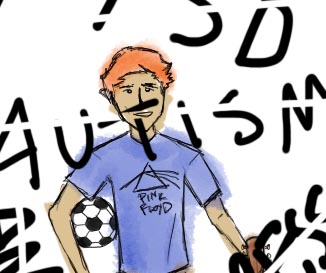It is in our nature to want to make complicated things easier to understand. We like to categorize things, and, through labeling, words have this power of simplification.
But some things defy the simplifying power of a single — or even several — words. One of those things is a person’s identity.
This past summer, I worked as a camp counselor with amazing children living with a variety of diagnoses that were emotional, behavioral and/or learning related. However, one of the camp’s policies was that the directors withheld the children’s specific diagnoses from us unless they felt that revealing a diagnosis was vital to a child’s success.
Before I met these kids, I was confused and a bit frustrated about this policy — why would they withhold information that could be so helpful to us?
The directors told us during training that at camp they wanted children to be known by their interests, passions and talents, rather than what challenges they face. They wanted us to know Jimmy not as “the kid who has a severe anxiety disorder” but as “the kid who is great at playing soccer.” Sarah not as “the girl with autism” but instead “the girl who loves animals.”
I wrongly thought of the diagnosis as some sort of “magic key” — the one word or phrase that would reveal everything about the child and how to work with him or her. Without realizing it, I had been trying to simplify each child’s identity in terms of their diagnosis.
There are, unfortunately, many factors that prevent us from openly talking about our challenges related to neurodiversity and mental health. My experiences with this camp revealed perhaps one of the most significant: We fear our identity will be eclipsed by a diagnosis, by something about our brain chemistry or hormones that contributes to these challenges. We worry that people will refer to us as “that guy with depression” or “that woman with the eating disorder.” We don’t want one aspect of our being to consume the way others perceive us.
Words have an immense, often underestimated, power to either inhibit people or make them feel more comfortable and safe sharing their vulnerabilities. If we strive to define people in terms of their personalities, passions, interests and quirks, hopefully this will be reflected in our dialogue, encouraging people to be more open because they will be less afraid of being defined by their challenges.
And when we do refer to conditions or diagnoses, adopting person-first language can help others know that we address the person before his or her condition: We can say “woman with autism” rather than “autistic” or “man with anorexia” rather than “anorexic.” We can stop referring to people who have schizophrenia or PTSD or anxiety disorders as “crazy.” We can be more careful and deliberate in our use of powerful, weighty words, such as the word “depressed” (missing our favorite show does not “make us depressed”). Our words can help foster an atmosphere of sensitivity, understanding and acceptance.
There is the phrase that the pen is mightier than the sword. Maybe for combatting the stigma surrounding mental health, it is truly our words that are the mightiest.
Email Andrea Aron-Schiavone at acaronschiavon@email.wm.edu.

